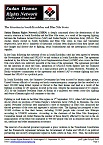The Situation in South Kordofan and Blue Nile States
 PDF – The Situation in South Kordofan and Blue Nile States
PDF – The Situation in South Kordofan and Blue Nile States
In South Kordofan state, the Sudanese Government has been accused by human rights groups, United Nations officials of carrying out harsh counterinsurgency campaign that has resulted in at least 200.000 being killed, injured or forced to flee their homes and land as a result of the fighting according to UN agencies located in the area. Despite the announcement of 23 August, 2011 by the Sudanese President Omer Al-Bashir of a unilateral two weeks cease fire, fighting and abuse of human rights still continues to this day.
Fighting as well broke in the Blue Nile region on 2nd September, 2011, when SAF instigated an all-out attack on positions of Sudan People’s Liberation Army (SPLA) in Damazin- the state capital. President Al-Bashir later announced a state of emergency in Blue Nile, dismissed the elected governor of the state and appointed a military ruler. The fighting has prompted at least 50.000 civilians to flee their homes, including 20.000 people who crossed into Ethiopia according to UNHCR estimates. According to the chairman of the Blue Nile Emergency Committee Almak Ali Abdel Rhman the number of those directly affected by the war in the six municipalities of the Blue Nile amounted to 494.000 people who are in desperate need for food aid, medicine and other humanitarian assistance.
The removal of an elected governor represents a gross violation to the Transitional Constitution and the Framework Agreement between the Government of Sudan and SPLM-N on political partnership and security arrangement signed in Addis Ababa in June, 2011. Thus, the militarized responses on Blue Nile, South Kordofan and Darfur clearly explained the failure of the government of the National Congress Party (NCP) on how to establish political stability in the country and its intention to rule by emergency law.
Sudan Humanitarian Aid Commission (HAC) has informed all international humanitarian organizations that they may resume their ongoing activities whenever the security situation permits and only with national staff. In Blue Nile HAC stated that all humanitarian assistance to affected people be channeled by the Sudanese Red Crescent Society (SRCS) in partnership with HAC.
In South Kordofan and Blue Nile, UN Office for the Coordination of Humanitarian Affairs (OCHA) has a limited presence its local staff can travel to Kadugli and Damazin by public transport but the international staff requires clearance from military intelligence to travel. The Sudanese authorities denied the UN humanitarian agencies and their international partners’ access into neighboring Sennar state and insisted on the provision of aid through local partners such as the Sudanese Red Crescent as it did in South Kordofan, the UN office announced. With the coming of the rainy season the need for plastic sheeting, clothing, blankets, sleeping mats, household items and water containers are becoming urgent. Drugs to combat waterborne diseases i.e. cholera, chlorination and insecticides kits are needed. There is increasing concern among humanitarian agencies about the presence of new land mines.
SHRN is deeply concerned about the ongoing fighting in South Kordofan and the Blue Nile states and calls upon all parties to the conflict to immediately halt the fighting.
SHRN calls on the Government of Sudan and the Sudan People’s Liberation Movement-North to agree on a process of dialogue to address roots causes of the conflict in South Kordofan and Blue Nile states. Negotiation is the only way to achieve long term peace, stability, and development to the people of the two states.
SHRN urges the Government of Sudan and Sudan People’s Liberation Movement-North to recognize and implement the Framework Agreement on Political Partnership and Security Arrangement signed on June 29, 2011.
SHRN calls on the Government of Sudan to lift the state of emergency imposed on 2nd of September, 2011, recognizes SPLM-N as a legal political party and unconditionally reinstate the democratically elected governor of the Blue Nile state.
SHRN urges both parties to allow the flow of humanitarian assistance to the affected people without hindrances and to ensure the protection of humanitarian staff.